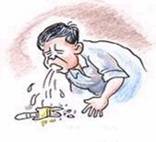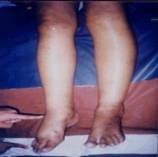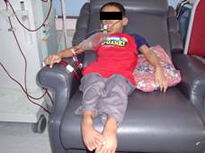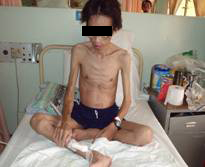Why are the kidneys so important?
The kidneys are two bean shaped organs that perform vital life maintaining functions. The functions of the kidneys are :
- Removal of waste products (urea, uraemic toxins) from the body
- Removal of excess water from the body
- Regulation of blood pressure
- Regulation of acids in the blood
- Regulations of minerals in the blood
- Production of hormones (erythropoietin which is responsible in production of red blood cells and active form of vitamin D which ensure healthy bones)
How common is kidney failure?
Since 2005, In Malaysia, about 3000 new patients are diagnosed to have End Stage Renal Failure (ESRF) yearly.
Total number of patients dialyzing in Malaysia currently is 14647 (as 31/12/2006). 90% of patients are on center haemodialysis where as 10% of patients are on peritoneal dialysis (using thr peritoneum route).
Kidney failure can be divided in to several stages according to its severity :- Stage I to V.
End Stage Renal Failure is said to occur when the kidney function is at stage V. You would require renal replacement theraphy to stay alive at the stage.
What are the common causes of kidney failure in Malaysia?
- Diabetes mellitus (54%)
- Glomerulonephritis (Inflammation of the kidneys)
- Renal stone disease
- Hypertension
- Others – Adults Polycystic Kidney disease, toxins
Table 1 : Renal Replacement Therapy Malaysia – Primary Renal Disease
|
Year
|
2000
|
2001
|
2002
|
2003
|
2004
|
2005
|
2006
|
|---|---|---|---|---|---|---|---|
| New Dialysis Patient |
1840
|
2085
|
2348
|
2597
|
2858
|
3054
|
3152
|
| % unknown cause |
28
|
30
|
30
|
29
|
28
|
26
|
27
|
| % diabetic nephropathy |
45
|
46
|
50
|
52
|
54
|
55
|
57
|
| % glomerulonephritis and SLE |
11
|
7
|
7
|
6
|
5
|
6
|
4
|
| % hypertension |
12
|
9
|
7
|
7
|
8
|
7
|
6
|
| % polycystic kidney disease |
1
|
2
|
1
|
1
|
1
|
1
|
1
|
| % obstructive nephropathy |
3
|
3
|
3
|
3
|
3
|
2
|
2
|
| % toxic nephropathy |
0
|
1
|
0
|
0
|
1
|
0
|
0
|
| % miscellaneous |
1
|
1
|
1
|
1
|
1
|
1
|
1
|
How do I know I have kidney disease?
Unfortunately, kidney disease may be silent with no signs until it has become very advanced. Therefore screening is advisable for those at high risk.

Suspect that you have kidney disease when you develop :
- General tiredness/lethargy (due to decrease in red blood cells)
- Nausea, vomiting, loss of appetite (due to accumulation of uremic toxins)
- Generalized itching of the body (pruritus)
- Bone pain
- Ankle swelling and shortness of breath (due to fluid accumulation)
- Sallow complexion
- Passing frothy urine
- Passing blood in the urine
- Have recurrent urinary tract infection
- Reduced urine output
- Increased frequency of urination especially increase urination at night (nocturia)
- Development of hypertension at a young age

Who is at high risk for developing kidney disease? What are the risk factors?
- If you are having high blood pressure
- If you are having diabetes mellitus
- If you have protein or blood in the urine
- If you have a single functioning kidney
- If you have an autoimmune disease like SLE
- If you have history of chronic ingestion of pain-killers or herbal preparations
- If you have family history of renal disease
- If you have heart disease
What investigations are required for the diagnosis of chronic kidney disease?
These would vary from person to person depending upon the cause.
The investigations would include :
- Urinalysis
- to look for proteinuria (protein in the urine)
- to look for haematuria (blood in the urine)
- to look for bacteriuria (bacteria in the urine)
- Blood tests. This will provide information such as :
- Severity of kidney failure
- Cause of the kidney failure – diabetes, SLE
- To look for complications of kidney disease – anemia, bone disease, etc
- You will also be asked to have an ultrasound of the kidneys to look for any reversible cause of renal failure
What do I do if I have End Stage Kidney Disease?
You would require renal replacement therapy (RRT) and therefore consult a nephrologist.
This can be accomplished in one of the following ways :
- Dialysis
- Hemodialysis (using the blood route)
- Peritoneal dialysis (using the peritoneum route)
- Kidney transplant
- Cadaver donated
- Living-relative donated
The nephrologists in charge of your care should be able to discuss all the available options with you. Following this you should be able to make your decision. Unfortunately, you can’t always get what you have opted for as it also depends on the availability and the suitability of that particular option and your co-morbid condition.
How do I know that I have to begin dialysis?
The need for dialysis is indicated by various findings :
- Symptoms of uremia – nausea, vomiting, loss of appetite, fits.
- Renal profile such as a high creatinine, high urea or high level of potassium.
- The development of fluid overload, malnutrition or anemia.
- The glomerular filtration rate of less than 10-15mls/min (a measurement of kidney function done by your doctor).

Patient who is short of breath fluid overloaded

Patient who is malnourished
Kidney Failure can be retarded with early detection, strict control of blood pressure, blood sugar and proteinuria.
Patients at risk of kidney diseases are strongly encouraged to go for screening of urine and blood. Those at risk are :
- Diabetes mellitus
- Hypertension
- Patients with renal stones
- Patients with family history of renal disease
- Patients with single functioning kidney
- Patients who are on regular pain-killers
See www.nkf.org.my.
Support group
Malaysian Society of Nephrology in collaboration with Malaysian Ministry of Health and National Kidney Foundation of Malaysia is currently conducting a Kidney Care Awareness Program which was launched on the 16/6/2005. – at website www.msn.org.my.
National Kidney Foundation of Malaysia – at web site www.nkf.org.my.
| Last reviewed | : | 01 August 2008 |
| Writer | : | Dr. Anita Bhajan Manocha |







